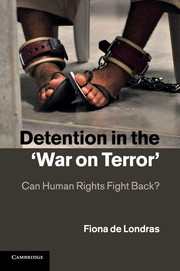Book contents
- Frontmatter
- Contents
- Acknowledgements
- Introduction
- 1 Panic, fear and counter-terrorist law-making
- 2 The right to be free from arbitrary detention
- 3 Counter-terrorist detention: the executive approach
- 4 Legislating for counter-terrorist detention
- 5 International human rights law's resilience in the face of panic
- 6 Judicial responses to counter-terrorist detention: rights-based resistance?
- Conclusion
- Bibliography
- Index
1 - Panic, fear and counter-terrorist law-making
Published online by Cambridge University Press: 05 August 2011
- Frontmatter
- Contents
- Acknowledgements
- Introduction
- 1 Panic, fear and counter-terrorist law-making
- 2 The right to be free from arbitrary detention
- 3 Counter-terrorist detention: the executive approach
- 4 Legislating for counter-terrorist detention
- 5 International human rights law's resilience in the face of panic
- 6 Judicial responses to counter-terrorist detention: rights-based resistance?
- Conclusion
- Bibliography
- Index
Summary
Domestic law-making processes tend not to cope particularly well in times of crisis. Panic, fear and populist impulses can conspire to create an atmosphere where the imperative turns towards combating a risk, and where that risk is presented and/or conceived of as being particularly grave or dangerous. The attacks of 11 September 2001 were without question events of such a magnitude as to strike fear into most people observing, not to mention the political leaders who found themselves faced with an enormous challenge. The immediate response to this challenge was, in some ways, unsurprising given our knowledge of law's lack of coping mechanisms in the context of crisis: the weight of both military and legal force was brought to bear on those considered to be responsible, the world (or at least most of it) rallied in support of the US, and there was a sense of having to communicate in strong and unequivocal terms that such acts of terrorism were entirely intolerable. The more long-term and systematic response, however, was not merely reactive; it also took an offensive and allegedly preventive form with the introduction of laws and policies (domestically and internationally) designed, we were told, to prevent a reoccurrence of such attacks. This book is concerned with one of the central planks of that response: the decision to detain suspected terrorists not only (or even primarily) with a view to preparing criminal charges against them but also as a preventive measure.
- Type
- Chapter
- Information
- Detention in the 'War on Terror'Can Human Rights Fight Back?, pp. 8 - 35Publisher: Cambridge University PressPrint publication year: 2011



